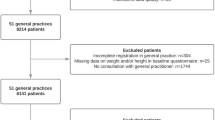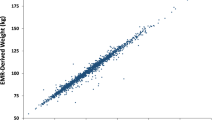Abstract
Background
The prevalence of weight loss is a quality indicator for nursing homes (NH), and monthly weight assessments are conducted by NH staff to determine weight loss.
Methods
A longitudinal study was conducted with 90 long-stay residents in four NHs for 12 study months. Monthly weight values documented in the medical record by NH staff were compared to independent weight values collected by research staff using a standardized protocol. Weight loss was defined according to the Minimum Data Set (MDS) criterion: ≥ 5% in 30 days or ≥ 10% in 180 days.
Results
The total frequency of weight loss episodes per person was comparable between NH and research staff weight assessments across the 12 study months. However, monthly weight values recorded by NH staff were consistently higher than values recorded by research staff, which resulted in a higher prevalence of weight loss and earlier identification of weight loss according to research staff weight values using a standardized weighing protocol.
Conclusions
A standardized weighing protocol improved the detection of weight loss among NH residents and should allow for earlier nutrition intervention.
Similar content being viewed by others
References
Abassi AA, Rudman D. Undernutrition in the nursing home: Prevalence, consequences, causes, and prevention. Nutr Rev. 1994;52(4):113–122.
Blaum CS, Fries BE, Fiatarone MA. Factors associated with low body mass index and weight loss in nursing home residents. J Gerontol A:Bio Sci Med Sci. 1995;50A:M162–M168.
Dwyer JT, Coleman KA, Krall E., et.al. Changes in relative weight among institutionalized elderly adults. J Gerontol A:Bio Sci Med Sci. 1987;42(3):246–251.
Sullivan DH, Johnson LE, Bopp MM, Roberson PK. Prognostic significance of monthly weight fluctuations among older nursing home residents. J Gerontol A:Bio Sci Med Sci. 2004;59A(6):633–639.
Simmons SF, Garcia ET, Cadogan MP, et al. The Minimum Data Set weight-loss quality indicator: Does it reflect differences in care processes related to weight loss? J Am Geriatr Soc. 2003;51:1410–1418.
The National Quality Forum. National Voluntary Consensus Standards for Nursing Home Care: A consensus report. Washington, DC: National Quality Forum; 2004.
Castellanos VH, Andrews YN. Inherent flaws in a method of estimating meal intake commonly used in long-term-care facilities. J Am Diet Assoc. 2002;102(6):826–830.
Kayser-Jones J, Schell ES, Porter C, et al. A prospective study of the use of liquid oral dietary supplements in nursing homes. J Am Geriatr Soc. 1998;46:1378–1386.
Kayser-Jones J, Schell E, Porter C, Paul S. Reliability of percentage figures used to record the dietary intake of nursing home residents. Nursing Home Medicine. 1997;5(3): 69–76.
Pokrywka HS, Koffler KH, Remsburg R, et al. Accuracy of patient care staff in estimating and documenting meal intake of nursing home residents. J Am Geriatr Soc. 1997;45:1223–1227.
Schnelle JF, Bates-Jensen B, Chu L, Simmons SF. Accuracy of nursing home medical record information about care process delivery: Implications for staff management and improvement. J Am Geriatr Soc. 2004;52(8):1378–1383.
Simmons SF, Reuben D. Nutritional intake monitoring for nursing home residents. A comparison of staff documentation, direct observation, and photography methods. J Am Geriatr Soc. 2000;48:209–213.
Simmons SF, Patel AV. Nursing home staff delivery of oral liquid nutritional supplements to residents at risk for unintentional weight loss. J Am Geriatr Soc. 2006 54(9):1372–1376.
Simmons SF, Keeler E, Xiaohui ZM, Schnelle JF. Prevention of unintentional weight loss in nursing home residents: A controlled trial of feeding assistance. J Am Geriatr Soc. In press.
Health Care Financing Administration. Long Term Care Facility Resident Assessment Instrument (RAI) User’s Manual, Minimum Data Set, Version 2. Natick: MA, Eliot Press, 1999.
Molloy DW, Alemayehu E, Roberts R. A standardized Mini-Mental State Examination (SMMSE): Its reliability compared to the traditional Mini-Mental State Examination (MMSE). Am J Psychiatry. 1991;148:102–105.
Thomas DR, Ashmen W, Morley JE, Evans WJ, and the Council for Nutritional Strategies in Long-Term Care. Nutritional management in long term care: Development of a clinical guideline. J Gerontol A:Bio Sci Med Sci. 2000;55A(12):M725–M734.
Simmons SF & Schnelle JF. Individualized feeding assistance care for nursing home residents: Staffing requirements to implement two interventions. J Gerontol A:Bio Sci Med Sci. 2004;59A(9):966–973.
Author information
Authors and Affiliations
Corresponding author
Rights and permissions
About this article
Cite this article
Simmons, S.F., Peterson, E.N. & You, C. The accuracy of monthly weight assessments in nursing homes: Implications for the identification of weight loss. J Nutr Health Aging 13, 284–288 (2009). https://doi.org/10.1007/s12603-009-0074-1
Received:
Accepted:
Published:
Issue Date:
DOI: https://doi.org/10.1007/s12603-009-0074-1




